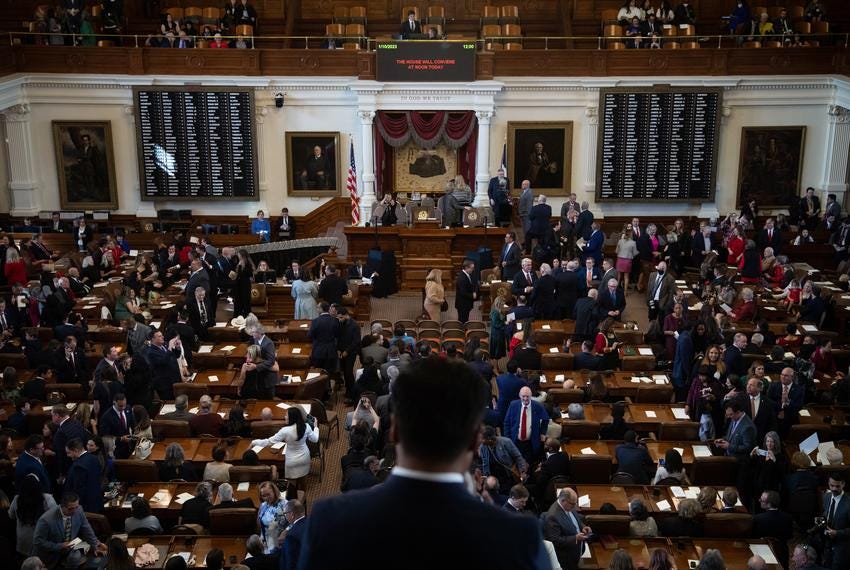Governors Can Not Remove Elected Legislators. Period.
A democracy must have an independent legislature. Only voters elect and unelect representatives.
By Jeremi Suri
You cannot have a democracy without an elected legislature. The Founders understood this, and they devoted the first and longest article of the Constitution to the creation of the national legislature. The elected representatives of the people, from various states, make all the laws. Article 4 of the Constitution applies this model to the states, requiring each of them to have a similar form of government. As James Madison famously explained, American democracy was built around the power of the people, vested in their elected legislatures.
That is why, for the two hundred and thirty-seven years since the founding of the republic, executives have NEVER had the power to remove elected legislators from office. Never. The vote of citizens for a representative is the most sacred thing in our democracy. Elected representatives cannot be impeached, like a president or judges. They cannot be disqualified by a felony conviction or even mental incapacity. And there is no one, other than the voters, to judge whether a representative is derelict in his duties. The remedy for a deficient representative is for his constituents to vote him out of office in the next election.
The only other way to remove an elected representative is by a two-thirds vote of the peers in the same legislature. This is a near-impossible hurdle, and it requires a very wide consensus in the house in which the representative serves. That explains why the members of Congress who supported the January 6, 2021 assault on the Capitol were not removed; their accusers could not get a two-thirds vote, despite overwhelming evidence of their treachery. Even in the most extreme cases of wrongdoing, elected representatives are entitled to the office they were elected to serve; no figure outside their legislative house has any standing to challenge that. If a president or a governor wants to get rid of an elected representative, they should campaign against them in the next election.
The Texas Constitution affirms all these points. If anything, it does even more to limit executive powers than the U.S. Constitution. The Texas governor has no role in the legislature other than calling special sessions and setting an agenda for those sessions. The two parts of the legislature, the Texas House of Representatives and the Texas Senate, set their own rules, committees, and procedures. The lieutenant governor, who serves as president of the Texas Senate, is elected separately from the governor and in no way accountable to him. The same is true for the speaker of the Texas House.
Unlike most other states, the Texas Constitution requires a two-thirds quorum for the House or Senate to deliberate. This was another measure to ensure legislative independence. Fearful that a majority, perhaps with the support of a governor, would try to ram harmful policies through the legislature, the state’s founders gave elected representatives from minority parties the power to shut things down. For most of Texas history, even into the early twenty-first century, that protection for minority parties in the legislature encouraged bipartisan cooperation, despite highly partisan governors. Time and again since at least 1870, minority members of the Texas House or Senate have broken quorum, or threatened to break quorum, for the purpose of negotiating a legislative compromise.
Regardless of where one stands on the current redistricting efforts in Texas, this history makes one thing clear: the governor cannot remove members of the legislature who have broken quorum. He has no such power. No governor has ever claimed such power. It runs against the full history of Texas and American democracy as a whole. The most sacred principle of democracy is that representatives are elected and unelected by their voters, not anyone else.
So why is the governor of Texas trying to do what he surely knows he cannot do? The only answer is an anti-democratic aspiration. Democracy protects the will of the people, as expressed in elections. Authoritarianism places power above the will of the people. Leaders who respect democracy respect law and tradition. Leaders who aspire to extreme personal power contort the law and disregard tradition to boost themselves. They ignore the obvious and exaggerate their authority to try and get their way. They do not follow the law; they break it and try to bully people into justifying their illegal actions. Rule of law protects the will of the people in a democracy; rule of authoritarians tries to reshape law to serve individual masters, in Austin or in Washington, DC.
The United States is still a democracy, and executives remain constrained from removing elected representatives from office. The fact that some executives are trying tells us something urgent and important: The future of our democracy depends on our national and state legislatures. Our elected representatives need to stand up to out-of-control executives and affirm that the legislators, not the governors or presidents, make the laws. Our elected representatives need to push back on executive bullying and take action to protect the rights of their voters.
Congress and state legislatures control all public resources, most government agencies, and vital high-level appointments. They must use those powers. One of those powers, in Texas, is the ability to shut down a legislative session hijacked by a governor and a president.
Also see in:
German, Turkish, Chinese, Spanish
Jeremi Suri holds the Mack Brown Distinguished Chair for Leadership in Global Affairs at the University of Texas at Austin. He is a professor in the University's Department of History and the LBJ School of Public Affairs. Professor Suri is the author and editor of eleven books on politics and foreign policy, most recently: Civil War By Other Means: America’s Long and Unfinished Fight for Democracy. His other books include: The Impossible Presidency: The Rise and Fall of America’s Highest Office; Liberty’s Surest Guardian: American Nation-Building from the Founders to Obama; Henry Kissinger and the American Century; and Power and Protest: Global Revolution and the Rise of Détente. His writings appear in the New York Times, Washington Post, Wall Street Journal, CNN.com, Atlantic, Newsweek, Time, Wired, Foreign Affairs, Foreign Policy, and other media. Professor Suri is a popular public lecturer and comments frequently on radio and television news. His writing and teaching have received numerous prizes, including the President’s Associates Teaching Excellence Award from the University of Texas and the Pro Bene Meritis Award for Contributions to the Liberal Arts. Professor Suri hosts a weekly podcast, “This is Democracy.”





Where did all these people come from that are backing and support an authoritarian government? It seems as though they were dumped on earth while no one was looking. Probably not, it is just a case of we haven't been paying attention or writing them off as kooks. Now they have a leader in Washington with a following of many lieutenants who will to do his dirty work at all levels of all governmental units. We are at a point in the United States where you are either for or against a democratic form of government. There is no in-between. I really hate to categorize a group, but at this point, it appears that most Republican legislators are anti democracy and are willing to do whatever is asked and fully support an authoritarian form of government and it's leaders. Unless something changes in their thinking, we have a very long and difficult road ahead.
Perfectly said, Jeremi. Megalomaniacal Governors do not get their way simply because they insist on it. Thanks for providing some clarity in these confusing times.